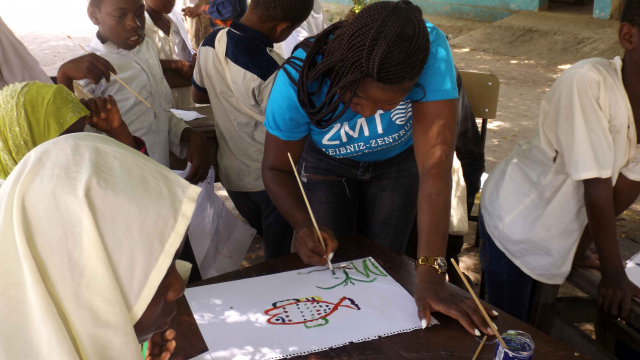In order to raise society's awareness of sustainability issues and involving society in its research, ZMT uses a wide variety of formats and events in the field of environmental education. ZMT´s office for Public Relations (PR) and the Office for Knowledge Exchange (OKE) cooperate in the development of materials and formats and have already carried out various projects. While the OKE focuses on improving the environmental education and capacity development of civil society actors in the tropics through appropriate formats, ZMT's public relations work addresses its activities mainly on the public and interest groups in Germany and its neighbouring countries.
Environmental education projects of public relations
ZMT's PR uses a wide variety of formats to address a broad public. Among them are lectures, exhibitions and trade fairs, Science Year events, open days or workshops for schoolchildren. Detailed information on the individual formats can be found here.
Environmental education projects of the OKE
- Cooperation with school classes can help to interest young generations in sustainability issues. For example, in the "Seagrass for Life" project in Zanzibar, schoolchildren, teachers, scientists, algae farmers and fishermen discussed the importance of the seagrass meadows for the local economy and environment. Children from four local schools are actively involved in the research by collecting washed up seagrass fruits on the beach and later observing the growth of new seedlings.
- Within the framework of the climate partnership between Bremen and Durban (South Africa), ZMT advises the City of Bremen in the areas of climate change, sustainability and marine conservation and trains municipal actors and young people. The topic of marine pollution has received special attention in the project "Bremen-Durban Marine Environmental Education Network" (MEEN). The brochure "Marine Plastic Pollution" developed in the project introduces teachers from Bremen and Durban to the topic and provides an overview of teaching and learning materials that can be used in school lessons. One of the aims of the MEEN project is to provide young people with knowledge about marine conservation in workshops. The so-called "Ocean Champs" pass on this knowledge in their communities to increase public awareness to the importance of marine conservation.
- ZMT´s Fact Sheet Series presents research results in a clearly structured way. It is used in environmental education with civil society actors. Depending on the target group's prior knowledge, the results can be presented in varying degrees of detail.
- Together with scientists from the University of Bremen, ZMT developed a virtual reality learning game. Based on a scientific simulation model, a 3D reef model was created. It enables the player to interact with the individual reef components in a virtual dive, examine reef organisms and solve tasks to protect the coral reef. The goal of the educational game is to improve the understanding of reef processes. Moreover, it contributes to bringing research findings about reef processes and management to the public.





